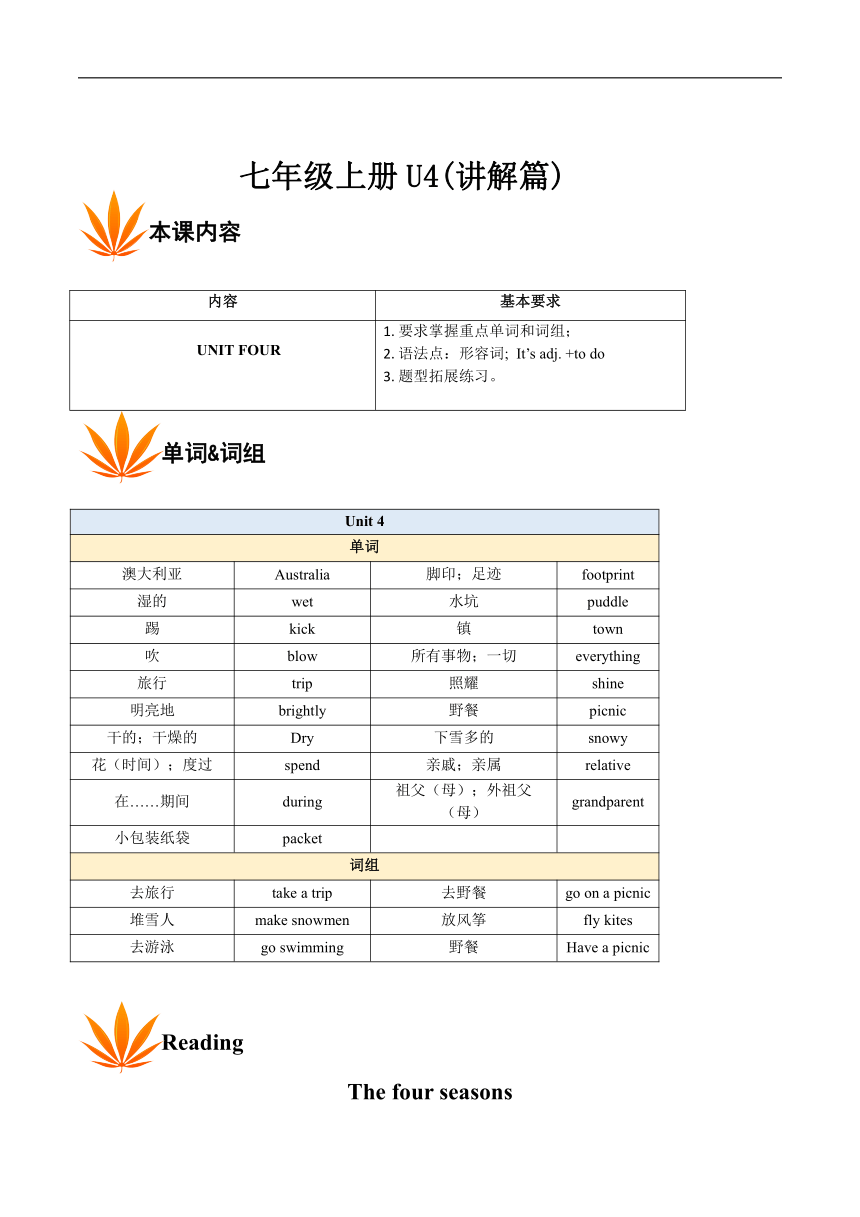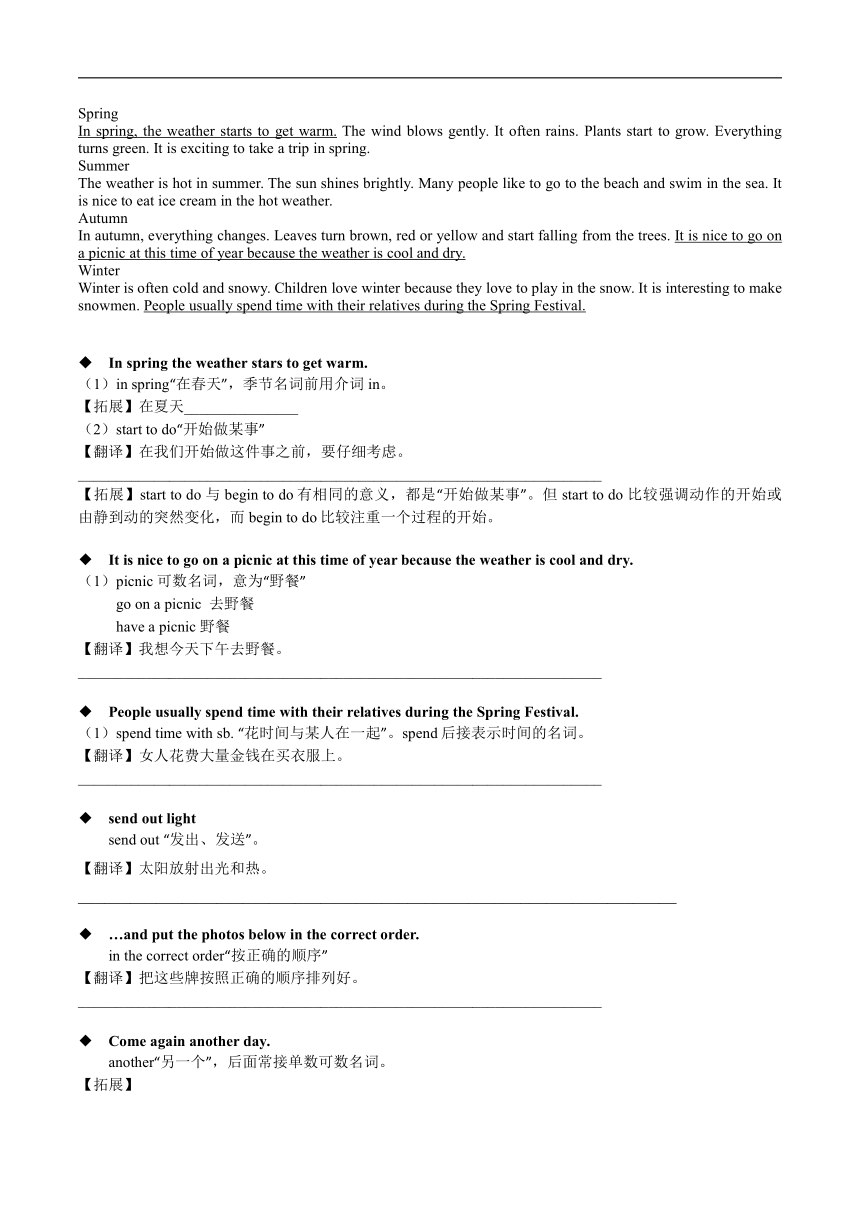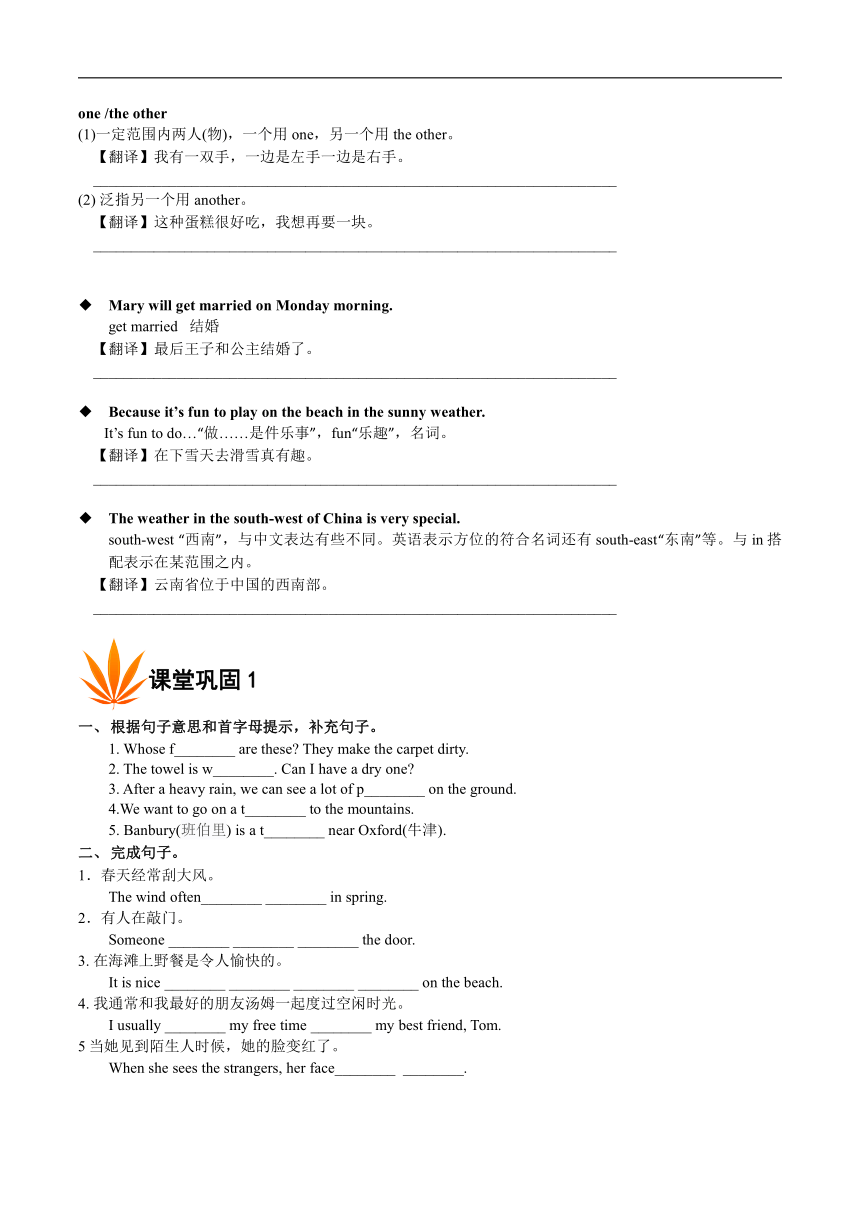牛津深圳版英语七年级上册 Unit 4 Seasons 学案(无答案)
文档属性
| 名称 | 牛津深圳版英语七年级上册 Unit 4 Seasons 学案(无答案) |  | |
| 格式 | docx | ||
| 文件大小 | 153.3KB | ||
| 资源类型 | 教案 | ||
| 版本资源 | 牛津深圳版 | ||
| 科目 | 英语 | ||
| 更新时间 | 2021-09-17 10:19:52 | ||
图片预览



文档简介
(
七年级上册U4(讲解篇)
)
(
本课内容
)
内容
基本要求
UNIT
FOUR
1.
要求掌握重点单词和词组;
2.
语法点:形容词;
It’s
adj.
+to
do
3.
题型拓展练习。
(
单词
&
词组
)
Unit
4
单词
澳大利亚
Australia
脚印;足迹
footprint
湿的
wet
水坑
puddle
踢
kick
镇
town
吹
blow
所有事物;一切
everything
旅行
trip
照耀
shine
明亮地
brightly
野餐
picnic
干的;干燥的
Dry
下雪多的
snowy
花(时间);度过
spend
亲戚;亲属
relative
在……期间
during
祖父(母);外祖父(母)
grandparent
小包装纸袋
packet
词组
去旅行
take
a
trip
去野餐
go
on
a
picnic
堆雪人
make
snowmen
放风筝
fly
kites
去游泳
go
swimming
野餐
Have
a
picnic
(
Reading
)
The
four
seasons
Spring
In
spring,
the
weather
starts
to
get
warm.
The
wind
blows
gently.
It
often
rains.
Plants
start
to
grow.
Everything
turns
green.
It
is
exciting
to
take
a
trip
in
spring.
Summer
The
weather
is
hot
in
summer.
The
sun
shines
brightly.
Many
people
like
to
go
to
the
beach
and
swim
in
the
sea.
It
is
nice
to
eat
ice
cream
in
the
hot
weather.
Autumn
In
autumn,
everything
changes.
Leaves
turn
brown,
red
or
yellow
and
start
falling
from
the
trees.
It
is
nice
to
go
on
a
picnic
at
this
time
of
year
because
the
weather
is
cool
and
dry.
Winter
Winter
is
often
cold
and
snowy.
Children
love
winter
because
they
love
to
play
in
the
snow.
It
is
interesting
to
make
snowmen.
People
usually
spend
time
with
their
relatives
during
the
Spring
Festival.
In
spring
the
weather
stars
to
get
warm.
(1)in
spring“在春天”,季节名词前用介词in。
【拓展】在夏天_______________
(2)start
to
do“开始做某事”
【翻译】在我们开始做这件事之前,要仔细考虑。
_____________________________________________________________________
【拓展】start
to
do
与begin
to
do有相同的意义,都是“开始做某事”。但start
to
do
比较强调动作的开始或由静到动的突然变化,而begin
to
do比较注重一个过程的开始。
It
is
nice
to
go
on
a
picnic
at
this
time
of
year
because
the
weather
is
cool
and
dry.
(1)picnic
可数名词,意为“野餐”
go
on
a
picnic
去野餐
have
a
picnic
野餐
【翻译】我想今天下午去野餐。
_____________________________________________________________________
People
usually
spend
time
with
their
relatives
during
the
Spring
Festival.
(1)spend
time
with
sb.
“花时间与某人在一起”。spend后接表示时间的名词。
【翻译】女人花费大量金钱在买衣服上。
_____________________________________________________________________
send
out
light
send
out
“发出、发送”。
【翻译】太阳放射出光和热。
_____________________________________________________________________
…and
put
the
photos
below
in
the
correct
order.
in
the
correct
order“按正确的顺序”
【翻译】把这些牌按照正确的顺序排列好。
_____________________________________________________________________
Come
again
another
day.
another“另一个”,后面常接单数可数名词。
【拓展】
one
/the
other
(1)一定范围内两人(物),一个用one,另一个用the
other。
【翻译】我有一双手,一边是左手一边是右手。
_____________________________________________________________________
(2)
泛指另一个用another。
【翻译】这种蛋糕很好吃,我想再要一块。
_____________________________________________________________________
Mary
will
get
married
on
Monday
morning.
get
married
结婚
【翻译】最后王子和公主结婚了。
_____________________________________________________________________
Because
it’s
fun
to
play
on
the
beach
in
the
sunny
weather.
It’s
fun
to
do…“做……是件乐事”,fun“乐趣”,名词。
【翻译】在下雪天去滑雪真有趣。
_____________________________________________________________________
The
weather
in
the
south-west
of
China
is
very
special.
south-west
“西南”,与中文表达有些不同。英语表示方位的符合名词还有south-east“东南”等。与in搭配表示在某范围之内。
【翻译】云南省位于中国的西南部。
_____________________________________________________________________
(
课堂巩固1
)
根据句子意思和首字母提示,补充句子。
1.
Whose
f________
are
these?
They
make
the
carpet
dirty.
2.
The
towel
is
w________.
Can
I
have
a
dry
one?
3.
After
a
heavy
rain,
we
can
see
a
lot
of
p________
on
the
ground.
4.We
want
to
go
on
a
t________
to
the
mountains.
5.
Banbury(班伯里)
is
a
t________
near
Oxford(牛津).
完成句子。
1.春天经常刮大风。
The
wind
often________
________
in
spring.
2.有人在敲门。
Someone
________
________
________
the
door.
3.
在海滩上野餐是令人愉快的。
It
is
nice
________
________
________
________
on
the
beach.
4.
我通常和我最好的朋友汤姆一起度过空闲时光。
I
usually
________
my
free
time
________
my
best
friend,
Tom.
5当她见到陌生人时候,她的脸变红了。
When
she
sees
the
strangers,
her
face________
________.
(
语法精讲
)
形容词的用法
【教材典句】
◆My
favourite
season
is
winter.我最喜欢的季节是冬天。
◆It
is
hot……
天气炎热…..
◆It's
interesting
to
see
leaves
start
growing
on
the
tree.
【语法全解】
1.形容词表示人或者事物的性质,状态,一般置于它所修饰的名词之前作定语,或连系动词之后作表语。
作定语
大多数形容词作定语修饰名词时,其位置在被修饰的名词前,说明名词的品质或特征。
当形容词所修饰的名词由some,
any,
every,
no等构成的复合不定代词时,形容词必须置于所修饰词之后。
enough
等形容词修饰名词时可前置或可后置
作表语
常位于连系动词be
,feel,
get,
turn等后面,说明主语的特征,状态或者身份。
She
is
a
tall
girl.她是一个高个子的女孩。
I
would
like
something
cheap
.我想要点便宜的东西。
We
have
enough
time/time
enough.我们有足够的时间。
He
is
happy,
but
I
feel
sad.他很高兴,而我感到很悲伤。
It
is
interesting
to
play
in
the
snow.在雪地里玩很有趣。
2.名词变形容词的方法:
(1)在名词后面—y可以变成形容词(尤其一些与天气有关的名词)。如:
rain-rainy
snow
–snowy
cloud-cloudy
wind-windy
health-healthy
luck-lucky
(2)少数以不发音的e结尾的名词变成形容词的时候,应去掉e再加y。如:
noise-noisy
ice-icy
3.It
is
+形容词+动词不定式(短语)
常用句型,在这个句型中常用以下词:interesting,
exciting,
nice,
easy,
difficult,
wrong,
right,
important等形
容词。
It
is
important
to
listen
to
the
teacher
carefully
in
class.
在课上认真听讲很重要。
【拓展】
在此句型中,如果说动词不定式的动作是谁做的,可在动词不定式前加一个介词for引起的短语,作动
词不定式的逻辑主语。
It
is
difficult
for
us
to
finish
the
work.
It
is
hard
for
me
to
answer
your
question.
如果表语是kind
,nice,
right,
wrong,
clever,
polite等描述行为者的性格,品质的形容词,则应在动词不定
式短语前加of引起的短语。
It
is
kind
of
you
to
help
me.你能帮我,真好。
(
课堂巩固2
)
单项选择
(
)
1.
What
do
you
think
of
the
lecture
(演讲)
of
Li
Yang’s
Crazy
English?
I
think
it’s
,
but
someone
thinks
it’s
much
too
.
A.wonderful
enough;
bored
B.
enough
wonderful;
boring
C.
wonderful
enough;
boring
D.
enough
wonderful;
bored
(
)2.
They
are
books
and
we
are
all
in
them
A.
insterested;
interested
B.
interesting;
interesting
interested;
interesting
D.
interesting;
interested
(
)3.
The
queen
wants
beautiful
than
the
princess
Snow
White.
is
more
B.
to
more
C.
to
be
very
D.
to
be
more
(
)4.
is
the
weather
like
today?
It’s
warm.
A.
How
B.
What
C.
Which
D.
Who
(
)5.
It’s
interesting
a
kite
in
the
wind.
A.
fly
B.
flies
C.
flying
D.
to
fly
(
)6.
Jim
wants
to
be
a
musician,
so
it’s
important
him
the
piano
well.
A.
for;
play
B.
of;
to
play
C.
for;
to
play
D.
of;
playing
(
)7.
He
is
badly
ill.
He
eats
.
A.
fewer
and
fewer
B.
little
and
little
C.
few
and
few
D.
less
and
less
(
)8.
Mary
often
half
an
hour
to
school
A.
spend,
to
walk
B.
spends,
walking
C.
spends,
to
walk
D.
spend,
walking
(
)9.______
is
important
for
us__________
English
well.
A.
It,
to
learn
B.
It,
learn
C.
This,
to
learn
D.
This,
swim
(
)10.In
winter,
it
often
________
so
the
weather
is
________
here.
A.
rain,
raining
B.
rains,
rainy
C.
raining,
rainy
D.
rainy,
rain
(
More
Practice
)
The
weather
in
China
In
the
north
of
China,
it
is
very
cold
and
dry
in
winter.
There
is
sometimes
heavy
snow.
Summer
is
different.
It
is
sometimes
very
hot
during
the
day,
but
it
is
often
cool
in
the
evening.
Spring
and
autumn
are
the
nicest
seasons.
The
weather
in
the
middle
and
east
of
China
is
quite
different.
It
is
hot
and
dry
in
summer
and
very
cold
and
wet
in
winter.
In
the
south
of
China,
winter
is
usually
short
and
cool.
It
sometimes
rains.
In
summer,
the
weather
is
often
hot
and
wet.
The
weather
in
the
south-west
of
China
is
very
special.
It
is
comfortable
to
live
there
because
summer
is
cool
and
winter
is
warm.
1.
In
the
north
of
China,
it
is
very
cold
and
dry
in
winter.
in
the
north
“在北方”,指在哪个方向时用介词in搭配。
【翻译】上海位于中国的东部。
_____________________________________________________________________
2.
There
is
sometimes
heavy
snow.
there
be存在句型,
表示“那里有。。。”
【翻译】在乡村有着更新鲜的空气。
_____________________________________________________________________
3.
different
adj.
不同的,与什么不同“be
different
to/
from”
【翻译】城市与乡村不同。
_____________________________________________________________________
4.
It
is
sometimes
very
hot
during
the
day,
but
it
is
often
cool
in
the
evening.
but表转折,也可以表“除了”
【翻译】除我以外,没别人来。
_____________________________________________________________________
5.
special
adj.
特别的,专门的
【翻译】你知道吗,你对我而言是很特别的。
_____________________________________________________________________
6.
It
is
comfortable
to
live
there
because
summer
is
cool
and
winter
is
warm..
It
is
+
形容词+
动词不定式(短语)
这是一个常用的句型,常用interesting,
exciting,
nice,
easy,
difficult,
hard,
good,
useful,
wrong,
right,
important等形容词。
【翻译】课堂上认真听老师讲课很重要。
_____________________________________________________________________
(
随堂巩固4
)
一、首字母填空
1.
We
should
not
throw
rubbish
onto
the
g______________.
2.
It’s
a
sunny
day.
The
sun
s_______________
brightly.
3.
During
the
Spring
Festival,
people
visit
their
friends
and
r______________.
4.
I
like
singing
very
much.
My
d____________
is
to
be
a
singer
one
day.
5.
The
flower
becomes
d______________
without
water.
二、完成句子
1.
多吃对蔬菜对你是有益处的。
It’s
_________
_________
you
if
you
eat
more
vegetables.
2.
Susan不擅长做数学题目。
Susan
__________
_________
________
________
Maths.
3.
他把污水倒进了河流里。
He
_________
the
dirty
water
___________
the
river.
4.
小明将参加校运会。
Xiao
Ming
will
________
________
________
the
sports
meeting.
5.
我喜欢与友好的人交朋友。
I
like
___________
__________
__________
friendly
people.
三、
单项选择
(
)
1.It’s
very
hot
today.
What
about
swimming?
go
B.
goes
C.
going
D.
went
(
)
2.He
bought
a
book
yesterday.
It
him
20
yuan.
costs
B.
costed
C.
cost
D.
costing
(
)
3.
impolite
to
laugh
at
the
disabled
man.
That’s
B.
This’s
C.
Its
D.
It’s
(
)
4.The
park
is
colourful
this
time
of
year.
at
B.
in
C.
on
D.
during
(
)
5.Hearing
the
words,
his
parents
got
.
angrier
B.
angriest
C.
angry
D.
angrily
(
)
6.The
story
happened
a
winter
morning.
in
B.
on
C.
of
D.
for
(
)
7.Why
did
you
go
out
the
rainy
weather?
in
B.
on
C.
with
D.
at
(
)
8.Today
everyone
the
exact
length
with
a
ruler.
know
B.
knew
C.
knows
D.
knowing
(
)
9.I
think
Unit
1
easier
than
Unit
2.
is
mere
B.
many
C.
is
much
D.
much
(
)
10.
John
arrived,
I
was
cooking
supper.
When
B.
While
C.
For
D.
Since
七年级上册U4(讲解篇)
)
(
本课内容
)
内容
基本要求
UNIT
FOUR
1.
要求掌握重点单词和词组;
2.
语法点:形容词;
It’s
adj.
+to
do
3.
题型拓展练习。
(
单词
&
词组
)
Unit
4
单词
澳大利亚
Australia
脚印;足迹
footprint
湿的
wet
水坑
puddle
踢
kick
镇
town
吹
blow
所有事物;一切
everything
旅行
trip
照耀
shine
明亮地
brightly
野餐
picnic
干的;干燥的
Dry
下雪多的
snowy
花(时间);度过
spend
亲戚;亲属
relative
在……期间
during
祖父(母);外祖父(母)
grandparent
小包装纸袋
packet
词组
去旅行
take
a
trip
去野餐
go
on
a
picnic
堆雪人
make
snowmen
放风筝
fly
kites
去游泳
go
swimming
野餐
Have
a
picnic
(
Reading
)
The
four
seasons
Spring
In
spring,
the
weather
starts
to
get
warm.
The
wind
blows
gently.
It
often
rains.
Plants
start
to
grow.
Everything
turns
green.
It
is
exciting
to
take
a
trip
in
spring.
Summer
The
weather
is
hot
in
summer.
The
sun
shines
brightly.
Many
people
like
to
go
to
the
beach
and
swim
in
the
sea.
It
is
nice
to
eat
ice
cream
in
the
hot
weather.
Autumn
In
autumn,
everything
changes.
Leaves
turn
brown,
red
or
yellow
and
start
falling
from
the
trees.
It
is
nice
to
go
on
a
picnic
at
this
time
of
year
because
the
weather
is
cool
and
dry.
Winter
Winter
is
often
cold
and
snowy.
Children
love
winter
because
they
love
to
play
in
the
snow.
It
is
interesting
to
make
snowmen.
People
usually
spend
time
with
their
relatives
during
the
Spring
Festival.
In
spring
the
weather
stars
to
get
warm.
(1)in
spring“在春天”,季节名词前用介词in。
【拓展】在夏天_______________
(2)start
to
do“开始做某事”
【翻译】在我们开始做这件事之前,要仔细考虑。
_____________________________________________________________________
【拓展】start
to
do
与begin
to
do有相同的意义,都是“开始做某事”。但start
to
do
比较强调动作的开始或由静到动的突然变化,而begin
to
do比较注重一个过程的开始。
It
is
nice
to
go
on
a
picnic
at
this
time
of
year
because
the
weather
is
cool
and
dry.
(1)picnic
可数名词,意为“野餐”
go
on
a
picnic
去野餐
have
a
picnic
野餐
【翻译】我想今天下午去野餐。
_____________________________________________________________________
People
usually
spend
time
with
their
relatives
during
the
Spring
Festival.
(1)spend
time
with
sb.
“花时间与某人在一起”。spend后接表示时间的名词。
【翻译】女人花费大量金钱在买衣服上。
_____________________________________________________________________
send
out
light
send
out
“发出、发送”。
【翻译】太阳放射出光和热。
_____________________________________________________________________
…and
put
the
photos
below
in
the
correct
order.
in
the
correct
order“按正确的顺序”
【翻译】把这些牌按照正确的顺序排列好。
_____________________________________________________________________
Come
again
another
day.
another“另一个”,后面常接单数可数名词。
【拓展】
one
/the
other
(1)一定范围内两人(物),一个用one,另一个用the
other。
【翻译】我有一双手,一边是左手一边是右手。
_____________________________________________________________________
(2)
泛指另一个用another。
【翻译】这种蛋糕很好吃,我想再要一块。
_____________________________________________________________________
Mary
will
get
married
on
Monday
morning.
get
married
结婚
【翻译】最后王子和公主结婚了。
_____________________________________________________________________
Because
it’s
fun
to
play
on
the
beach
in
the
sunny
weather.
It’s
fun
to
do…“做……是件乐事”,fun“乐趣”,名词。
【翻译】在下雪天去滑雪真有趣。
_____________________________________________________________________
The
weather
in
the
south-west
of
China
is
very
special.
south-west
“西南”,与中文表达有些不同。英语表示方位的符合名词还有south-east“东南”等。与in搭配表示在某范围之内。
【翻译】云南省位于中国的西南部。
_____________________________________________________________________
(
课堂巩固1
)
根据句子意思和首字母提示,补充句子。
1.
Whose
f________
are
these?
They
make
the
carpet
dirty.
2.
The
towel
is
w________.
Can
I
have
a
dry
one?
3.
After
a
heavy
rain,
we
can
see
a
lot
of
p________
on
the
ground.
4.We
want
to
go
on
a
t________
to
the
mountains.
5.
Banbury(班伯里)
is
a
t________
near
Oxford(牛津).
完成句子。
1.春天经常刮大风。
The
wind
often________
________
in
spring.
2.有人在敲门。
Someone
________
________
________
the
door.
3.
在海滩上野餐是令人愉快的。
It
is
nice
________
________
________
________
on
the
beach.
4.
我通常和我最好的朋友汤姆一起度过空闲时光。
I
usually
________
my
free
time
________
my
best
friend,
Tom.
5当她见到陌生人时候,她的脸变红了。
When
she
sees
the
strangers,
her
face________
________.
(
语法精讲
)
形容词的用法
【教材典句】
◆My
favourite
season
is
winter.我最喜欢的季节是冬天。
◆It
is
hot……
天气炎热…..
◆It's
interesting
to
see
leaves
start
growing
on
the
tree.
【语法全解】
1.形容词表示人或者事物的性质,状态,一般置于它所修饰的名词之前作定语,或连系动词之后作表语。
作定语
大多数形容词作定语修饰名词时,其位置在被修饰的名词前,说明名词的品质或特征。
当形容词所修饰的名词由some,
any,
every,
no等构成的复合不定代词时,形容词必须置于所修饰词之后。
enough
等形容词修饰名词时可前置或可后置
作表语
常位于连系动词be
,feel,
get,
turn等后面,说明主语的特征,状态或者身份。
She
is
a
tall
girl.她是一个高个子的女孩。
I
would
like
something
cheap
.我想要点便宜的东西。
We
have
enough
time/time
enough.我们有足够的时间。
He
is
happy,
but
I
feel
sad.他很高兴,而我感到很悲伤。
It
is
interesting
to
play
in
the
snow.在雪地里玩很有趣。
2.名词变形容词的方法:
(1)在名词后面—y可以变成形容词(尤其一些与天气有关的名词)。如:
rain-rainy
snow
–snowy
cloud-cloudy
wind-windy
health-healthy
luck-lucky
(2)少数以不发音的e结尾的名词变成形容词的时候,应去掉e再加y。如:
noise-noisy
ice-icy
3.It
is
+形容词+动词不定式(短语)
常用句型,在这个句型中常用以下词:interesting,
exciting,
nice,
easy,
difficult,
wrong,
right,
important等形
容词。
It
is
important
to
listen
to
the
teacher
carefully
in
class.
在课上认真听讲很重要。
【拓展】
在此句型中,如果说动词不定式的动作是谁做的,可在动词不定式前加一个介词for引起的短语,作动
词不定式的逻辑主语。
It
is
difficult
for
us
to
finish
the
work.
It
is
hard
for
me
to
answer
your
question.
如果表语是kind
,nice,
right,
wrong,
clever,
polite等描述行为者的性格,品质的形容词,则应在动词不定
式短语前加of引起的短语。
It
is
kind
of
you
to
help
me.你能帮我,真好。
(
课堂巩固2
)
单项选择
(
)
1.
What
do
you
think
of
the
lecture
(演讲)
of
Li
Yang’s
Crazy
English?
I
think
it’s
,
but
someone
thinks
it’s
much
too
.
A.wonderful
enough;
bored
B.
enough
wonderful;
boring
C.
wonderful
enough;
boring
D.
enough
wonderful;
bored
(
)2.
They
are
books
and
we
are
all
in
them
A.
insterested;
interested
B.
interesting;
interesting
interested;
interesting
D.
interesting;
interested
(
)3.
The
queen
wants
beautiful
than
the
princess
Snow
White.
is
more
B.
to
more
C.
to
be
very
D.
to
be
more
(
)4.
is
the
weather
like
today?
It’s
warm.
A.
How
B.
What
C.
Which
D.
Who
(
)5.
It’s
interesting
a
kite
in
the
wind.
A.
fly
B.
flies
C.
flying
D.
to
fly
(
)6.
Jim
wants
to
be
a
musician,
so
it’s
important
him
the
piano
well.
A.
for;
play
B.
of;
to
play
C.
for;
to
play
D.
of;
playing
(
)7.
He
is
badly
ill.
He
eats
.
A.
fewer
and
fewer
B.
little
and
little
C.
few
and
few
D.
less
and
less
(
)8.
Mary
often
half
an
hour
to
school
A.
spend,
to
walk
B.
spends,
walking
C.
spends,
to
walk
D.
spend,
walking
(
)9.______
is
important
for
us__________
English
well.
A.
It,
to
learn
B.
It,
learn
C.
This,
to
learn
D.
This,
swim
(
)10.In
winter,
it
often
________
so
the
weather
is
________
here.
A.
rain,
raining
B.
rains,
rainy
C.
raining,
rainy
D.
rainy,
rain
(
More
Practice
)
The
weather
in
China
In
the
north
of
China,
it
is
very
cold
and
dry
in
winter.
There
is
sometimes
heavy
snow.
Summer
is
different.
It
is
sometimes
very
hot
during
the
day,
but
it
is
often
cool
in
the
evening.
Spring
and
autumn
are
the
nicest
seasons.
The
weather
in
the
middle
and
east
of
China
is
quite
different.
It
is
hot
and
dry
in
summer
and
very
cold
and
wet
in
winter.
In
the
south
of
China,
winter
is
usually
short
and
cool.
It
sometimes
rains.
In
summer,
the
weather
is
often
hot
and
wet.
The
weather
in
the
south-west
of
China
is
very
special.
It
is
comfortable
to
live
there
because
summer
is
cool
and
winter
is
warm.
1.
In
the
north
of
China,
it
is
very
cold
and
dry
in
winter.
in
the
north
“在北方”,指在哪个方向时用介词in搭配。
【翻译】上海位于中国的东部。
_____________________________________________________________________
2.
There
is
sometimes
heavy
snow.
there
be存在句型,
表示“那里有。。。”
【翻译】在乡村有着更新鲜的空气。
_____________________________________________________________________
3.
different
adj.
不同的,与什么不同“be
different
to/
from”
【翻译】城市与乡村不同。
_____________________________________________________________________
4.
It
is
sometimes
very
hot
during
the
day,
but
it
is
often
cool
in
the
evening.
but表转折,也可以表“除了”
【翻译】除我以外,没别人来。
_____________________________________________________________________
5.
special
adj.
特别的,专门的
【翻译】你知道吗,你对我而言是很特别的。
_____________________________________________________________________
6.
It
is
comfortable
to
live
there
because
summer
is
cool
and
winter
is
warm..
It
is
+
形容词+
动词不定式(短语)
这是一个常用的句型,常用interesting,
exciting,
nice,
easy,
difficult,
hard,
good,
useful,
wrong,
right,
important等形容词。
【翻译】课堂上认真听老师讲课很重要。
_____________________________________________________________________
(
随堂巩固4
)
一、首字母填空
1.
We
should
not
throw
rubbish
onto
the
g______________.
2.
It’s
a
sunny
day.
The
sun
s_______________
brightly.
3.
During
the
Spring
Festival,
people
visit
their
friends
and
r______________.
4.
I
like
singing
very
much.
My
d____________
is
to
be
a
singer
one
day.
5.
The
flower
becomes
d______________
without
water.
二、完成句子
1.
多吃对蔬菜对你是有益处的。
It’s
_________
_________
you
if
you
eat
more
vegetables.
2.
Susan不擅长做数学题目。
Susan
__________
_________
________
________
Maths.
3.
他把污水倒进了河流里。
He
_________
the
dirty
water
___________
the
river.
4.
小明将参加校运会。
Xiao
Ming
will
________
________
________
the
sports
meeting.
5.
我喜欢与友好的人交朋友。
I
like
___________
__________
__________
friendly
people.
三、
单项选择
(
)
1.It’s
very
hot
today.
What
about
swimming?
go
B.
goes
C.
going
D.
went
(
)
2.He
bought
a
book
yesterday.
It
him
20
yuan.
costs
B.
costed
C.
cost
D.
costing
(
)
3.
impolite
to
laugh
at
the
disabled
man.
That’s
B.
This’s
C.
Its
D.
It’s
(
)
4.The
park
is
colourful
this
time
of
year.
at
B.
in
C.
on
D.
during
(
)
5.Hearing
the
words,
his
parents
got
.
angrier
B.
angriest
C.
angry
D.
angrily
(
)
6.The
story
happened
a
winter
morning.
in
B.
on
C.
of
D.
for
(
)
7.Why
did
you
go
out
the
rainy
weather?
in
B.
on
C.
with
D.
at
(
)
8.Today
everyone
the
exact
length
with
a
ruler.
know
B.
knew
C.
knows
D.
knowing
(
)
9.I
think
Unit
1
easier
than
Unit
2.
is
mere
B.
many
C.
is
much
D.
much
(
)
10.
John
arrived,
I
was
cooking
supper.
When
B.
While
C.
For
D.
Since
